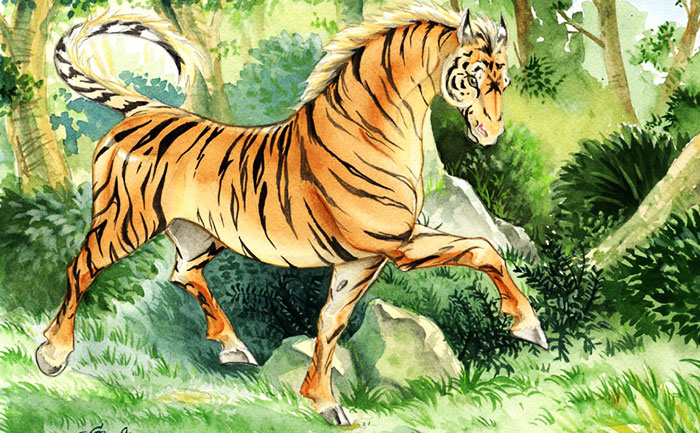“Is this a tiger or a horse?”
Simplified Chinese
以前,有一个画家。他喜欢画奇怪的东西。别人都看不懂他画什么。
有一天,他在画老虎。他刚刚画了老虎的头。画家的朋友来了,让画家画马。画家直接在老虎的头后面画了马的身体。
画家的朋友问他,“这是老虎还是马?”画家回答:“马马虎虎”。
画家的朋友看不懂画家画的“马马虎虎”,就回家了。画家把画挂在家里。
画家的大儿子问画家画的是什么。画家说:“老虎”。不久以后,小儿子也过来问画家画的是什么。画家说:“马”。
大儿子去逛街,看见了别人的马。他想到爸爸说:“这是老虎”,然后把马杀死了。画家不得不赔钱。
小儿子去森林,看见了老虎。他想到爸爸说:“这是马”,然后想要骑它。最后,老虎吃了他。
画家很伤心,把自己的“马马虎虎”画烧了。
现在,人们用“马马虎虎”这个成语来形容“很随便”或者“不怎么样”。怎么用“马马虎虎”这个成语呢?
造句例子(很随便的意思):
1)你做事要认真一点,不要马马虎虎。
2)哥哥早上急着去上班,把胡子刮得马马虎虎。
造句例子(不怎么样的意思):
1)她的英语讲得马马虎虎,不是很好,也不是很烂。
2)我最近的生意做的马马虎虎,有时候有客人,但是不多。
Traditional Chinese
以前,有一個畫家。他喜歡畫奇怪的東西。別人都看不懂他畫什麼。
有一天,他在畫老虎。他剛剛畫了老虎的頭。畫家的朋友來了,讓畫家畫馬。畫家直接在老虎的頭後面畫了馬的身體。
畫家的朋友問他:「這是老虎還是馬?」畫家回答:「馬馬虎虎」。
畫家的朋友看不懂畫家畫的「馬馬虎虎」,就回家了。畫家把畫掛在家裡。
畫家的大兒子問畫家畫的是什麼。畫家說:「老虎」。不久以後,小兒子也過來問畫家畫的是什麼。畫家說:「馬」。
大兒子去逛街,看見了別人的馬。他想到爸爸說:「這是老虎」,然後把馬殺死了。畫家不得不賠錢。
小兒子去森林,看見了老虎。他想到爸爸說:「這是馬」,然後想要騎牠。最後,老虎吃了他。
畫家很傷心,把自己的「馬馬虎虎」畫燒了。
現在,人們用「馬馬虎虎」這個成語來形容「很隨便」或者「不怎麼樣」。怎麼用「馬馬虎虎」這個成語呢?
造句例子(很隨便的意思):
1)你做事要認真一點,不要馬馬虎虎。
2)哥哥早上急著去上班,把鬍子刮得馬馬虎虎。
造句例子(不怎麼樣的意思):
1)她的英語講得馬馬虎虎,不是很好,也不是很爛。
2)我最近的生意做的馬馬虎虎,有時候有客人,但是不多。
English Translation
Once there was a painter. He liked to draw strange things. No one else could understand what he drew.
One day he was painting tigers. He just drew the tiger’s head. The painter’s friend came and asked the painter to paint a horse. The painter drew the horse’s body directly behind the tiger’s head.
The painter’s friend asked him: “Is this a tiger or a horse?” The painter replied: “Horse horse tiger tiger [ma ma hu hu]”
The painter’s friends couldn’t understand the “Horse horse tiger tiger” painted by the painter and went home. The painter hung the painting at home.
The painter’s oldest son asked the painter, what the painter had painted. The painter said, “A tiger.” Soon after, the younger son came over and asked the painter, what the painter had painted. The painter said, “A horse.”
The oldest son strolled the road and saw someone else’s horse. He thought of his father saying, “This is a tiger,” and then killed the horse. The painter had no choice but to pay the compensation [to the horse owner].
The younger son went to the forest and saw a tiger. He thought of his father saying, “This is a horse,” and then made an attempt to ride it. In the end, the tiger ate him.
The painter was very grieved, and then burned his “Ma Ma Hu Hu [=sloppy]” painting.
Now, people use the chengyu “Ma Ma Hu Hu” to describe, “careless” or “so-so”. How to use the chengyu “Ma Ma Hu Hu”?
Example sentences (“careless” meaning):
1) You have to be serious in doing things, don’t be so careless.
2) This morning my brother was in a hurry to go to work. so he shaved his beard carelessly.
Example sentences (“so-so” meaning):
1) Her English is so-so, not very good, but also not bad.
2) My business is so-so nowadays, there are customers sometimes, but not many.
Indonesia Translation
Dulu, ada seorang pelukis. Dia suka melukis hal-hal yang aneh. Orang-orang lain pun tidak mengerti apa yang ia lukis.
Suatu hari dia melukis harimau. Dia baru saja menggambar kepala harimau. Teman si pelukis datang dan meminta si pelukis untuk melukis seekor kuda. Pelukis itu menggambar tubuh kuda tepat di belakang kepala harimau.
Teman si pelukis bertanya kepadanya: “Apakah ini harimau atau kuda?” Pelukis itu menjawab: “Kuda kuda harimau harimau [ma ma hu hu]”
Teman si pelukis tidak bisa memahami “Kuda kuda harimau harimau” yang dilukis oleh pelukis, dan dia pun pulang. Sang pelukis pun menggantung lukisan itu di rumah.
Putra tertua si pelukis bertanya kepada si pelukis, apa yang telah dilukis oleh si pelukis. Pelukis itu berkata, “Seekor harimau.” Segera setelah itu, putra bungsu datang dan bertanya, apa yang telah dilukis oleh pelukis. Pelukis itu berkata, “Seekor kuda.”
Putra tertua pergi jalan-jalan dan melihat kuda orang lain. Dia ingat ayahnya berkata, “Ini adalah harimau,” dan kemudian membunuh kuda itu. Pelukis tidak punya pilihan selain membayar kompensasi [kepada pemilik kuda].
Anak bungsu pergi ke hutan dan melihat harimau. Dia ingat ayahnya berkata, “Ini adalah kuda,” dan kemudian berusaha untuk menungganginya. Pada akhirnya, harimau itu memakannya.
Pelukis itu sangat sedih, dan kemudian membakar lukisan “Ma Ma Hu Hu [= ceroboh]”nya.
Sekarang, orang menggunakan chengyu “Ma Ma Hu Hu” untuk menggambarkan “ceroboh (atau asal)” atau “biasa-biasa saja”. Bagaimana cara menggunakan chengyu “Ma Ma Hu Hu”?
Contoh kalimat (artinya “ceroboh atau asal”):
1) Anda harus serius dalam melakukan sesuatu, jangan terlalu ceroboh.
2) Pagi ini kakak saya sedang terburu-buru untuk pergi bekerja. jadi dia mencukur janggutnya dengan asal.
Contoh kalimat (artinya “biasa-biasa saja”):
1) Bahasa Inggrisnya biasa-biasa saja, tidak terlalu baik, tetapi juga tidak buruk.
2) Bisnis saya saat ini biasa-biasa saja, kadang ada pelanggan, tetapi tidak banyak.
Photo source here.

